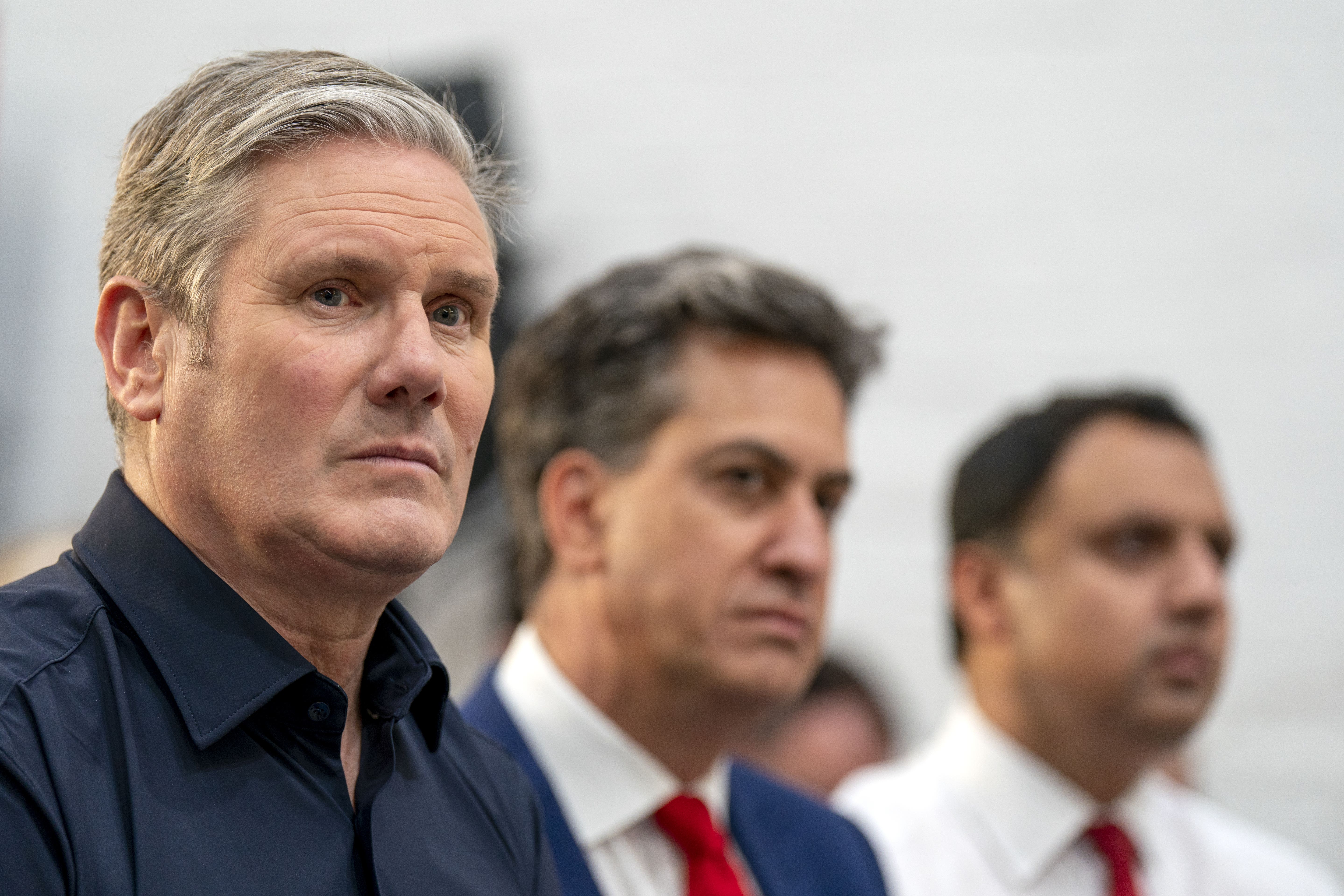Sunak’s oil deal divided Tories but revealed another fissure – inside the Labour Party
The heated debate between Starmer and Miliband on climate highlights the Labour Party’s fundamental dilemma, writes Andrew Grice: whether to opt for pragmatism or posturing to win the cause – and the election


When Rishi Sunak announced the approval of “hundreds” of new North Sea oil and gas licences this week, he hoped to draw a dividing line between the Conservatives and Labour. He succeeded: Labour confirmed it will not issue any new North Sea licences if it wins next year’s general election.
But Sunak managed to create another dividing line – inside Labour. Ed Miliband, the shadow climate and net zero secretary, wants to “go big” (the title of his book) on Labour’s ban on new licences, arguing that trumpeting it loudly would display strong leadership on climate both at home and abroad.
He has a point. The government is resting on its laurels after being quick off the mark on renewables – as Sunak appears to dilute the measures needed to achieve net zero, the UK’s days as a global trailblazer are sadly over. Even the government’s own figures show it is behind schedule on reaching net zero by 2050. Advertising an end to new licences for fossil fuels would set a powerful example to other nations when the threat to the planet has been upgraded to “global boiling”.
However, Keir Starmer and his shadow chancellor Rachel Reeves are opposing Miliband’s plan. They do not want to put to Labour’s ban on new licences in neon lights – which could be a sign that the Tories have won the argument about using North Sea resources while they last.
While Sunak’s plan to “max out” the UK’s energy sounds like common sense after the dramatic impact of the war in Ukraine, the truth is less convenient for him. The price of North Sea oil and gas is set on international markets, and last year 81 per cent of UK oil production and 61 per cent of its gas supply were exported. And it’s hardly common sense to burn more fossil fuels when the International Energy Agency has said there is no space for any oil and gas expansion if the world is to hit net zero on time.
Instead, a Labour government would rightly prioritise more investment in renewables.
I’m told that Miliband initially wanted to go further, by revoking any existing North Sea licences after the election, but that idea was also blocked by Starmer. Miliband now accepts that a ban on future contracts is Labour’s policy.
Some Starmer allies are angry with Miliband, insisting that shouting Labour’s ban from the rooftops would not impress anyone outside of his green “cult”. Starmer has sugared the pill for energy producers, and for trade unions with members working in the North Sea, by stressing that “oil and gas are going to be part of the mix for decades to come, into the 2050s”.
Despite the tensions, Starmer will reject pressure from Miliband’s critics to sack the climate change secretary when he reshuffles his shadow cabinet after the summer break. Relations between a current and a former leader in any party are often uneasy, but Labour sources insist the two men have a good working relationship. Perhaps keeping Miliband inside his tent gives Starmer some cover with green voters. Labour needs to protect its left flank from a Green Party revived by events, and the Liberal Democrats have strong credentials on the issue.
The climate debate is inevitably hotting up, and passions are running high. The protest at Sunak’s North Yorkshire home, a huge embarrassment for those responsible for his security, will not be the last. At more elections I have covered than I dare to count, the environment has been tipped to be a big issue, but it’s usually the dog that doesn’t bark. At next year’s contest, though, the scary evidence of climate change before our very eyes will surely mean that it cannot be ignored.
That will pose a big challenge for both the main parties. The Tories can’t take too much satisfaction from Labour’s split, as they are also divided. Green Tories are appalled by Sunak’s opportunist change of language since the Uxbridge and South Ruislip by-election. There are tensions in the cabinet as well as in the shadow cabinet: Kemi Badenoch, the business secretary, is accused by Sunak’s allies of “playing games” and appealing to right-wing net zero sceptics by questioning the car industry’s electric vehicle targets.
Labour’s heated debate on climate highlights the party’s fundamental dilemma: whether to opt for “pragmatism or posturing”, as one insider put it. Starmer has done well on providing reassurance to the Tory voters he needs to win over, but he has not yet offered the hope for which many people are crying out.
Labour’s dilemma will be repeated in other areas, including the economy, public services and Brexit. Starmer’s welcome present, if he gets to Downing Street, will be a fiscal straitjacket left behind by the Tories. So for him, pragmatism, rather than posturing, will be the order of the day, and we shouldn’t underestimate his determination to do whatever it takes to win.


Join our commenting forum
Join thought-provoking conversations, follow other Independent readers and see their replies
Comments